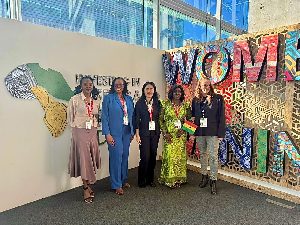Accra, Nov. 18, GNA - Dr. Kwabena Duffuor, Minister of Finance, on Wednesday said government would establish an oil industrialisation plan next year to ensure judicious application of the expected revenue from oil exploration in the country.
"During the 2010 fiscal year, Government will develop Oil and Gas Industrialisation Plan," he said.
"It is expected that through such strategic oil and gas driven industrialisation programme, the country's manufacturing sector would receive a significant boost, which in turn would contribute to a rapid and sustainable growth of the economy," Dr Duffuor added.
He announced this when presenting the 2010 Budget to Parliament in Accra.
This is the second budget since the National Democratic Congress came to power on January 7, 2009.
Dr Duffuor explained that under the plan, feasibility studies would be conducted into collaboration between strategic diversification and accelerated growth which is lacking in the country.
He said revenue from oil and gas exploration in Ghana would be channelled into the development of petrochemical industries in the country. "Government's vision with respect to oil and gas is to channel the resources to support the development of petrochemical industries," he said. Dr. Duffour stressed the need to carefully manage the oil and gas resources to ensure accelerated growth, development and creation of opportunities now and for future generations to benefit.
He said government was working to ensure the timely exploitation of the natural resource, and establish conditions through which oil and gas resources would serve as a catalyst to accelerate growth of the manufacturing and other sectors.
"This would help promote diversification of the economy, create massive jobs, and stimulate private sector development, "he added.
The Finance Minister said the gas resources would be used to support energy-based industries, such as glass bottles, steel mills, aluminium smelting and rolling mill operations which had faced serious challenges from the high cost and irregular power supply.
He noted that the oil and gas resources would in addition serve as catalyst for the commercial exploitation of other natural resources that had either not been exploited, or exploited but not processed into high value products for domestic use and exports.
"Government has plans to include the exploitation of sea salt, iron ore, bauxite, limestone and silica sand potential in the country for processing after the energy supply and value-added constraints have been dealt with using gas as the main source of energy," he said. Dr. Duffuor said government had plans to develop gas turbines with higher energy efficiency, thereby bringing the current high energy tariffs under control.
He said methanol, ethanol, ammonia, urea, and others, would be processed out of the gas to produce fertilisers locally to enhance agricultural production and to boost exports.
The Finance Minister noted that the most interesting aspect of the downstream effect of the oil and gas was to open up many areas of the country that had in the past been left out of industrial development. "With oil production coming on stream and the prospects of additional oil refineries looking very certain, oil residue would become available to support the development of petro-chemical products such as PVC and other plastics to expand manufacturing production and create substantial employment opportunities," he said.
He pointed out that this would in addition create an opportunity for the locally mined limestone from Buipe to be used for domestic production of lime-based cement, and attract large scale investment in sea salt production.
Dr. Duffuor said it had been estimated that about one million tonnes of salt could be produced from the Keta and Songhor Basins with improved land-use policies and newly designed and operating technologies. He said the eastern coastal areas stretching from Keta to Ada and Prampram as well as the western coast from Sekondi-Takoradi to Axim would be opened up for heavy industrialisation.
"It is also expected that Kibi in the Eastern Region, Nyinahin in the Ashanti Region, Buipe in the Northern Region, Oppon Manso and Abosso in the Western Region, where deposits of bauxite, limestone, silica sand, iron ore exist would soon become sites for heavy industries once the energy, transport and other infrastructural constraints are removed," he said. 18 Nov. 09
General News of Wednesday, 18 November 2009
Source: GNA












